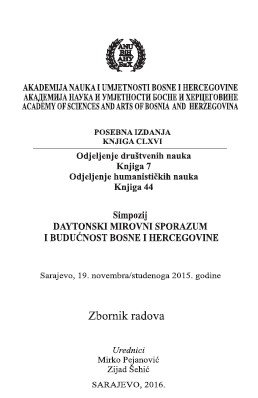DEJTON I GRAĐANSKO DRUŠTVO U BOSNI I HERCEGOVINI
DAYTON AND CIVIL SOCIETY IN BOSNIA AND HERZEGOVINA
Author(s): Žarko Papić
Subject(s): Civil Society, Government/Political systems, Politics and society, Culture and social structure , Transformation Period (1990 - 2010), Present Times (2010 - today), Socio-Economic Research, Politics and Identity
Published by: Akademija Nauka i Umjetnosti Bosne i Hercegovine
Keywords: civil society; middle class; political parties; NGO;
Summary/Abstract: Civil society and its consciousness must have their economic and social basis. There must be what is called “the middle class”. There is no middle class in Bosnia and Herzegovina, society is socially divided between the narrow circle of the tycoon-political oligarchy and the vast majority of impoverished people, without jobs and living at minimum of existence. Inequalities – financial and social – in Bosnia and Herzegovina are vast, and the factor that enlarges them is the present discrimination (territorial, status, marginalized groups, etc.). The absence of the middle class is one of the reasons for the lack of democracy in our country. These are not economic and social conditions that allow the development of civil society. This on the other hand are the conditions for ideological and political manipulation of national or civic identity. For important, positive changes in BiH, development of civil society is an important prerequisite, especially the awareness that government serves the citizens, and not that they “need” the government just to maintain. The best way to achieve this is to learn the lessons, change the approach, first of all through support to policies to strengthen the real private sector and the permeation of civil and national identity. This is a good recipe against nationalism and “production” of national conflicts. Regardless of – in principle – good intentions, support to the development of civil society by international organizations gave very weak results. This “glass is nearly empty.” One of the main reasons are focusing on non-governmental organizations, with the neglect of other important “sectors” of civil society – unions, religious communities, academia, etc. It seems that these have been left to the party influences and manipulations.
Book: DAYTONSKI MIROVNI SPORAZUM I BUDUĆNOST BOSNE I HERCEGOVINE
- Page Range: 211-218
- Page Count: 8
- Publication Year: 2015
- Language: Bosnian, Croatian, Serbian
- Content File-PDF

